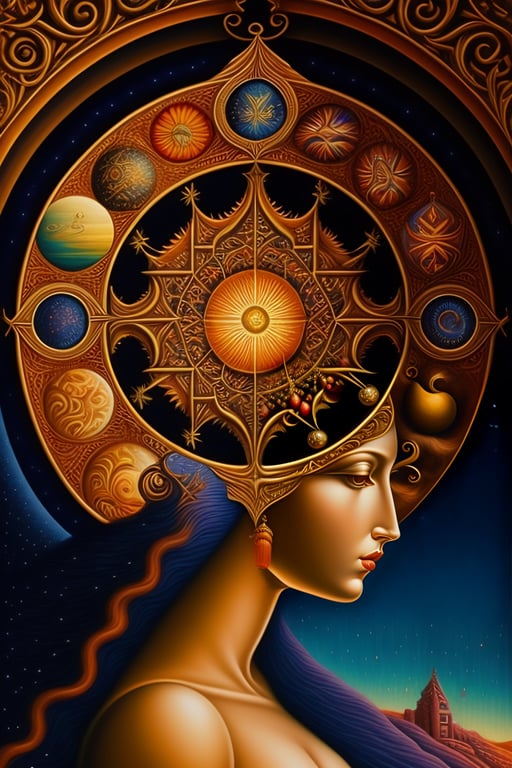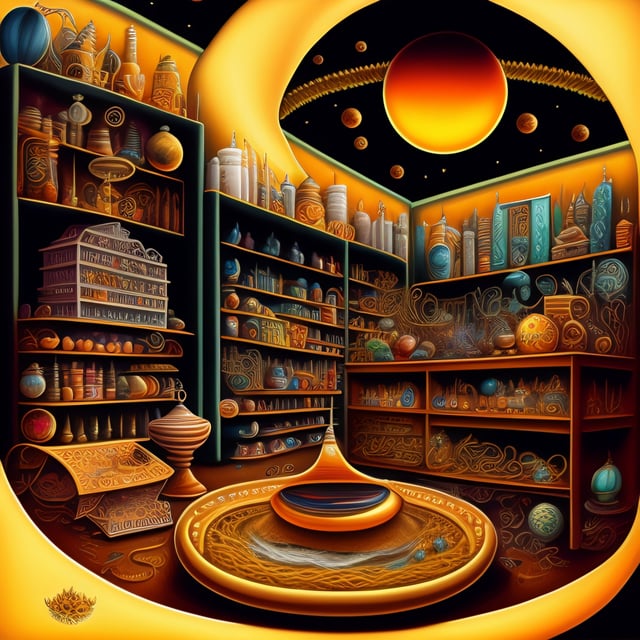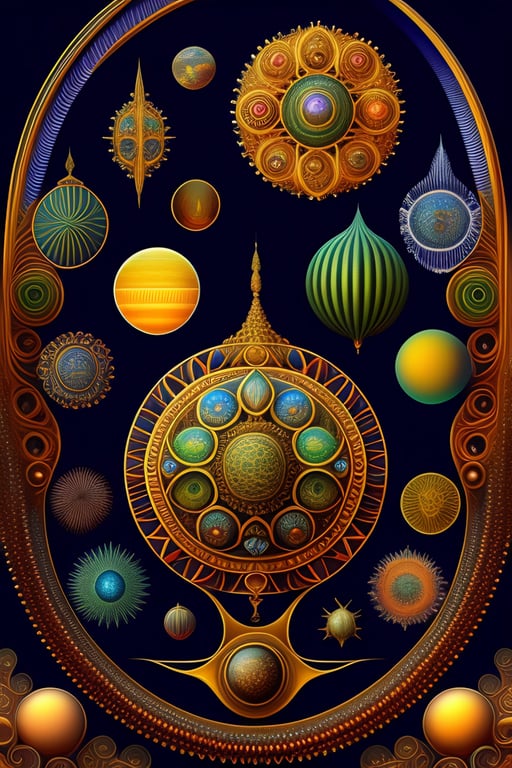The Intricacies of Mythical Cosmology and Creation Stories
Part 1: Introduction to Mythical Cosmology and Creation Stories
Mythical
cosmology and creation stories are prevalent in many cultures throughout the
world. They provide a framework for understanding the world and the universe
and often involve a creation myth or story that explains the origin of the
world, the cosmos, and humanity. In this multipart blog, we will explore the
intricacies of mythical cosmology and creation stories, examining their
similarities and differences across cultures and delving into their deeper
meanings and significance.
Part 2: Common Themes in Creation Stories
While
creation stories differ across cultures, there are common themes that emerge.
For example, many creation stories involve a primal chaos or void out of which
the universe was created. Creation may also involve the separation of the
elements, such as the separation of light from darkness or the separation of
the sky from the earth. Additionally, many creation stories feature a creator or
creators who bring the universe into being, often through some act of divine
will or power.
Part 3: The Significance of Creation Stories
Creation
stories are more than just explanations for the origin of the world and the
universe. They also serve important cultural and social functions. For example,
creation stories may reinforce social hierarchies or provide a basis for
ethical and moral behavior. Additionally, creation stories often express
cultural values and beliefs, serving as a means of transmitting these values
from generation to generation.
Part 4: Mythical Cosmology Across Cultures
Mythical
cosmology differs across cultures, reflecting the unique perspectives and
experiences of different peoples. For example, the Norse creation story
features a primordial void out of which emerged the first beings, while the
Chinese creation story involves the interaction of yin and yang forces to bring
about the world. Similarly, the creation story of the Navajo people involves a
series of emergence stories that explain the origin of different parts of the
world.
Part 5: The Role of Mythical Cosmology in Religion
Mythical
cosmology is often closely tied to religion and religious practices. Creation
stories provide a basis for religious beliefs and practices, including the
worship of deities or other spiritual beings. Additionally, creation stories
may be linked to religious rituals and ceremonies, such as the creation stories
of the Abrahamic religions, which are closely tied to their respective
religious practices.
Part 6: The Evolution of Creation Stories
Creation
stories have evolved over time, reflecting changing cultural and social
contexts. For example, the creation stories of the Abrahamic religions have
undergone significant changes over time, reflecting the changing beliefs and
practices of these religions. Similarly, the creation stories of indigenous
peoples have undergone changes as a result of colonization and the impact of
other cultures.
Part 7: The Relevance of Mythical Cosmology Today
While
creation stories are often seen as relics of the past, they continue to be
relevant today. They provide a framework for understanding the world and the
universe, and they offer insights into different cultures and their values and
beliefs. Additionally, creation stories can serve as a source of inspiration
and guidance, offering a perspective on the human condition that is often
missing in modern society.
Part 8: Conclusion Mythical cosmology
Mythical
cosmology and creation stories are an important part of human culture and
history. They offer a unique perspective on the world and the universe, and
they provide a basis for religious beliefs and practices. While creation stories
differ across cultures, they share common themes and serve important cultural
and social functions. By exploring the intricacies of mythical cosmology and
creation stories, we can gain a deeper understanding of the human experience
and the world around us.
Next Part:
Part 9: Critiques and Challenges to Mythical Cosmology
Despite
the enduring relevance of mythical cosmology and creation stories, there have
been critiques and challenges to their validity and usefulness. One such
critique is that creation stories are merely myths or stories that have no
basis in reality. This critique is often advanced by those who prioritize
scientific explanations of the origin of the universe and the world.
Another
challenge to mythical cosmology is that it can be used to reinforce oppressive
social hierarchies and justify discrimination and inequality. For example, the
creation story of Adam and Eve in the Abrahamic religions has been used to
justify patriarchal social norms and exclude women from positions of power.
Part 10: Balancing Mythical Cosmology with Modern Science
Despite
these critiques and challenges, many people continue to find value in mythical
cosmology and creation stories. One way to balance the insights of these
stories with modern science is to view them as complementary rather than
opposing perspectives. For example, while modern science may offer an
explanation for the physical processes that led to the formation of the
universe, creation stories offer a perspective on the human experience and our
relationship to the world around us.
Part 11: Mythical Cosmology and Personal Meaning
Mythical
cosmology and creation stories can also hold personal meaning for individuals.
They may offer a framework for understanding the events and experiences of our
own lives, as well as a sense of connection to a larger spiritual or cultural
community. For example, the creation stories of indigenous peoples often
emphasize the importance of respecting and living in harmony with the natural
world, offering a valuable perspective on our relationship with the
environment.
Part 12: The Importance of Mythical Cosmology for Cultural Preservation
Finally,
mythical cosmology and creation stories are an important tool for cultural
preservation. They offer a window into the history and beliefs of different
cultures and provide a means of passing these beliefs and values down to future
generations. By preserving and honoring these stories, we can ensure that they
continue to play a role in shaping our understanding of the world and our place
within it.
Part 13: Conclusion Mythical cosmology
Mythical
cosmology and creation stories are a rich and complex part of human culture and
history. While they may face critiques and challenges, they continue to offer
valuable insights into the human experience and our relationship to the world
and the universe. By exploring and preserving these stories, we can deepen our
understanding of different cultures and gain a greater appreciation for the
diversity and complexity of the human experience.
Final Part:
Part 14: Final Thoughts
In
conclusion, the intricacies of mythical cosmology and creation stories reveal a
deep connection between human beings and the world around us. They offer
insights into the origins of the universe, the role of humanity in it, and the
meaning and purpose of existence. Although they are often viewed as stories or
myths, their importance in shaping human history and culture cannot be
overstated.
While
modern science has provided us with a wealth of information about the physical
universe, it cannot fully explain the complexity of human experience and the
meaning we derive from it. Mythical cosmology and creation stories offer an
important perspective on these aspects of human life.
As
we continue to explore and understand the world around us, it is important to
value and preserve the rich cultural heritage of mythical cosmology and
creation stories. By doing so, we can deepen our understanding of the world and
ourselves, and gain a greater appreciation for the diversity and complexity of
the human experience.
- Mythical cosmology
- Creation stories
- Ancient civilizations
- Origins of the universe
- Folklore
- Mythical creatures
- Religious beliefs
- Cosmogony
- Symbolism
- Anthropology
- Cultural history
- Divine beings
- Worldview
- Mythic imagination
- Sacred spaces
- Rituals
- Comparative mythology
- Mythological archetypes
- Theology
- Hero's journey
- Origin of life
- Cosmic order
- Time and space
- Myths as metaphor
- Creation and destruction
- Mythological motifs
- Mythic storytelling
- Mythic symbolism
- Ancient wisdom
- Esoteric knowledge.



Comments
Post a Comment